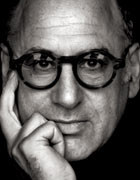Michael Nyman Live
11-Jun-2008Wingates Band
Conductor: Andrew Berryman
Featuring: John Doyle, Peter Moore, Michael Nyman
Cadogan Hall, London,
Saturday 7th June
 It is relatively rare to find a brass band included in a prestigious concert series. Grimethorpe’s appearance a couple of years back as part of a Malcolm Arnold celebration on the South Bank being a notable exception.
It is relatively rare to find a brass band included in a prestigious concert series. Grimethorpe’s appearance a couple of years back as part of a Malcolm Arnold celebration on the South Bank being a notable exception.
Michael Nyman’s links with the Wingates Band stem from the connection between their conductor, Andrew Berryman, and Nigel Barr, bass trombone player and Michael Nyman’s business manager. Having studied together at the Guildhall School of Music and Drama back in 1980, they followed very different career paths, Andrew obtaining orchestral posts, first with the Ulster Orchestra and since 1988 with the Halle Orchestra, whilst Nigel’s encompassed a much more diverse range, including music theatre and session work, as well as playing in the Michael Nyman Band.
Five concert series
Renewing their acquaintance at a recording session a few years back, it was suggested that some of Michael’s music should be arranged for brass band, leading to the release of the cd Nyman Brass. Thus it was that Wingates found themselves performing in London’s Cadogan Hall as part of a five-concert series, alongside such artists as the Michael Nyman Band and soprano Sarah Leonard.
They opened their programme with one of Michael Nyman’s most well-known pieces, “Chasing sheep is best left to shepherds”. Featured in Peter Greenaway’s film “The Draughtsman’s Contract”, it is a reworking of music by Henry Purcell.
Driving
The opening was marked by a characteristic driving bass line, with crisply articulated figures from the cornet section. Gradually, contrasting rhythms were introduced, setting up conflict between the various lines. An oasis of calm came with the cessation of the background rhythms revealing a quiet interlude on horns and baritones before a solo played by Principal Cornet Andy MacDonald, who performed sterling service throughout the programme.
Answering phrases on cornets and trombones followed, the bass trombone particularly prominent, over which a euphonium countermelody soared, before a return to the opening material. With tight ensemble playing around the band it made for a confident start to the concert.
The Ogre
Volker Schlondorff’s “The Ogre” did not receive a cinema release in the UK, and the band version has given the music some welcome additional exposure. Wingates presented five of the eight movements, commencing with “Magic Forest”. Opening with some bravura playing by the horn section, backed by driving cornets, the brief movement featured rhythmic patterns set against each other most effectively.
“Goering’s Hunting Party” contained elements that Mozart would have recognised, with prominent percussion and busy patterns underpinning a smooth chorale-like melody in the upper instruments. A sudden change of mood brought a change of key and a calmer coda to end the movement.
Daunting
Principal Tuba Mick Morris was faced with the daunting task of the solo to open “Child bearer”, seeming even higher in performance than on the recording. He did a grand job, projecting the solo line over sustained chords from the band, and receiving support from first the flugel then solo cornet. Repeated semiquavers on muted cornets and horns crept in, together with the euphonium, before the movement ended rather abruptly, with the music left hanging in the air.
“Meeting the moose” featured powerful rhythms in the cornets, rather reminiscent initially of one of John Williams fanfares, until the metre began changing, with the accent subtly shifting. The melodic line was projected in shot notes over the top, and the music built up in excitement and intensity with quite a hypnotic effect, before being interrupted by a subito piano cornet melody.
Fine legato
Cornet and flugel played independent figures, overlapping one with the other, sometimes as if in duet but frequently clashing, before a reprise of the opening figures. The final bars consisted of a trombone solo over sustained chords, eliciting some fine legato playing from Peter Moore.
The final section featured was entitled “Abel carries Ephraim”. Repeated crotchets in the bass and shot notes from the cornets were accompanied by chords building in the middle of the band, with a heroic French-horn-style melody emerging as the pulse remained the same despite the constantly changing metre.
Eerie effect
There was a rather eerie effect as muted cornets were heard with a muffled side drum, before a meandering melody which started in the cornets gradually passed round the band. With some unusual writing in the bass line – as if tubas and bass trombone could not decide who had the real bass part – the flugel and euphonium brought forth a melody in a calmer mood, gentle playing against sustained, full chords as the music gradually faded away.
 John Doyle
John Doyle
Michael Nyman’s “Flugelhorn and Piano” is a formidable test for both players, and presented several problems for John Parkinson, entrusted with adapting the piano part for band. Former Black Dyke flugel player John Doyle was the featured soloist, looking very relaxed in open-necked shirt in contrast to the more formal uniforms worn by the band.
He met the work’s challenges head-on, with his mellow tone carrying well over the band across the full range of the instrument. The tricky accompaniment, often featuring intricate figures at low dynamics, was handled extremely well, with the irregular rhythms in the bottom of the band neatly together and nicely sustained lines in the slower section.
Acclaim
There was a palpable sense of relief at one point when soloist and band both cut off abruptly together, and then came a succession of short rising figures from the soloist as the music became more and more frenetic towards the close. This could have become very disjointed but band and soloist maintained the overall shape of the music to the triumphant conclusion, whereupon the composer joined the performers on the stage to join in the acclaim for this premier performance.
The second solo appearance was not included in the printed programme: following the victory of 12 year-old Principal Trombone Peter Moore in the BBC Young Musician Competition, it was suggested that Michael Nyman should arrange an item for them to play together.
Peter Moore
He selected a melody entitled “If”, taken from music to a film of “The Diary of Ann Frank”, and Peter presented it masterfully, with a beautifully controlled line and a mature interpretation that belied his tender years. Largely played at a low dynamic level, when a crescendo was called for it came with no loss of tonal quality, matched by Michael Nyman’s sensitive playing of the piano part.
Andrew Berryman explained that the film “The Libertine” was based on the exploits of John Wilmot, Earl of Rochester, and that the titles of the movements had needed a little censoring to make them acceptable to the general public! Two movements were chosen, commencing with “The Mistress”, featuring Andy MacDonald in an extended solo.
Vibraphone and muted cornets provided the background, joined by the horns, before the soloist entered, the melody being quite fragmented and needing careful phrasing to keep the music flowing. The flugel eventually took over, giving Andy a well-deserved breather, before he returned to bring the movement to its gentle conclusion.
 Contrast
Contrast
In total contrast, the short “Signior D” was much livelier, soon settling into a lilting one in a bar, with striking unison figures throughout the band, and contrasting phrases gradually moving against one another.
The other new piece to be presented was “The Battle for the Old Age Pension”, commissioned by the National Pensioners Convention to mark the centenary of the fight for the right to an old age pension. Having been performed in front of the Pensioners’ Parliament on Blackpool on 3rd June it was receiving its first public performance, and there was a group of pensioners present who held up a banner to mark the occasion.
In three untitled movements, it featured a prominent piano part, played commandingly by percussionist Andrea Crossley. Beginning with steady crotchets throughout the band semiquaver figurations were introduced on trombones and later cornets before syncopated figures vied with one another.
Tricky
There was also a tricky soprano solo which was tucked in very neatly. The second movement featured flugel and piano in strongly accented figures, with further syncopation, with the 4/4 pattern soon being interrupted by various changes in metre.
The last movement was a rather quirky march – shades of Ethel Smyth’s “March of the Suffragettes”? – with the melody starting on soprano and basses, but then the music gradually shifted away a uniform beat, providing a striking echo effect as some phrases finished a quaver or semiquaver late, frequently with heavy accents on the final notes.
Time
Time was at a premium, as the hall needed to be cleared ready for the next concert taking place later that evening, but there was room for one further item, this time arranged by Andrew Berryman himself. “In Re Don Giovanni” is based on the first fifteen bars of the “Catalogue Song” from Mozart’s opera “Don Giovanni”, Michael Nyman having taken Mozart’s chord progressions and developed the various lines in his own individual style.
Once again, the cornets in particular faced stamina-sapping repeated semiquavers, whilst the euphoniums, basses and bass trombone punched out the bass line. The high-lying euphonium melody – which Andrew said would turn the players’ faces bright red! – marked the entry of the soloist in the original. It was appropriate that Andrew should bring the entire cornet section to its feet at the end of the performance, in recognition of their efforts, before acknowledging the other soloists and the band as a whole.
Excellent showcase
All in all, it was an excellent showcase for what is achievable by a brass band, with skilled arrangers using the full range of tone colours available and with talented players more than doing justice to the music put in front of them.
Amongst the audience was a gentleman who had come over from France for the whole of the weekend, and who explained that, although he had not previously been a fan of brass bands, the Michael Nyman link had brought a new appreciation of the genre.
BBC recording
As Andrew Berryman said afterwards, one of the aims of the project was to open people’s minds to new possibilities. Although there were only about a hundred listeners in the hall, the concert was recorded by the BBC, so hopefully it will be made available to a wider audience in due course.
Peter Bale









